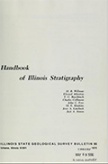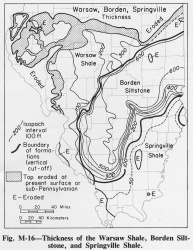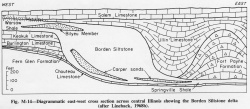Historical:Borden Siltstone
Lithostratigraphy: Mammoth Cave Limestone Megagroup >>Borden Siltstone
Chronostratigraphy: Paleozoic Erathem >>Mississippian Subsystem >>Valmeyeran Series
Allostratigraphy: Kaskaskia Sequence
Authors
Elwood Atherton, Charles Collinson, and Jerry A. Lineback
Name Origin
The Borden Siltstone (Cumings, 1922, p. 487) is named for Borden, Clark County, Indiana, where it is well exposed.
Extent and Thickness
The Borden Siltstone forms an elongate, tongue-shaped delta immediately east of the pinchout of the Burlington and Keokuk Limestones. It is continuous with the Borden Group of Indiana. The formation reaches more than 650 feet thick (fig. M-16), but it does not crop out in Illinois.
Stratigraphic Position
The Borden is laterally equivalent to the Warsaw Shale and is separated from it by a vertical cut-off at the position of the eastern pinchout of the Burlington and Keokuk Limestones (fig. M-14). In southern and southeastern Illinois, the Borden is separated from the equivalent Springville Shale by a vertical cut-off where the siltstone thins to less than 100 feet thick. The Borden overlies the Chouteau Limestone and is overlain by the Fort Payne Formation, or the Ullin, Salem, or St. Louis Limestones.
Description
The Borden in Illinois is dominantly gray to brownish gray, argillaceous, slightly calcareous, glauconitic, fine-grained siltstone, with lesser amounts of silty shale, some greenish gray coarse siltstone or fine sandstone, and light-colored, fossiliferous, cherty limestone. A persistent bed of coarse siltstone and fine sandstone is differentiated as the Bilyeu Member. Beds of fine sandstone and coarse siltstone near the base of the Borden are informally called the "Carper sand" (Moulton, 1926), and the name has been extended to similar beds in the Springville Shale (Lineback, 1968a). Some of the sandstones contain oil (Stevenson, 1964).
Depositional Environment
The Borden Siltstone delta was deposited as a series of southward-developing imbricate topset, foreset, and bottomset beds (Swann et al., 1965; Lineback,1966). Depositional dips of foreset bedding planes range from 25-120 feet per mile toward the delta margin. The delta was built into a deep-water basin. The "Carper sand" is now believed to have been deposited by multiple turbidity flows off the mouths of distributaries. At least six major turbidite systems as much as 300 feet thick have been recognized, some of which extend for many miles and lens out or grade into the Springville Shale.
References
CUMINGS, E. R., 1922, Nomenclature and description of the geological formations of Indiana, in Handbook of Indiana geology: Indiana Department of Conservation Publication 21, p. 403-570.
LINEBACK, J. A., 1966, Deep-water sediments adjacent to the Borden Siltstone (Mississippian) delta in southern Illinois: Illinois State Geological Survey Circular 401, 48 p.
LINEBACK, J. A., 1968a, Subdivisions and depositional environments of New Albany Shale (Devonian-Mississippian) in Indiana: American Association of Petroleum Geologists Bulletin, v. 52, p. 1291-1303.
MOULTON, G. F., 1926, Areas for further prospecting near the Martinsville Pool, Clark County: Illinois State Geological Survey Illinois Petroleum 4, 12 p.
STEVENSON, D. L., 1964, Carper sand oil production in St. James, Wilberton, and St. Paul pools, Fayette County, Illinois: Illinois State Geological Survey Circular 362, 12 p.
SWANN, D. H. , J. A. LINEBACK, and EUGENE FRUND, 1965, Borden Siltstone (Mississippian) delta in southwestern Illinois: Illinois State Geological Survey Circular 386, 20 p.
ISGS Codes
| Stratigraphic Code | Geo Unit Designation |
|---|---|


